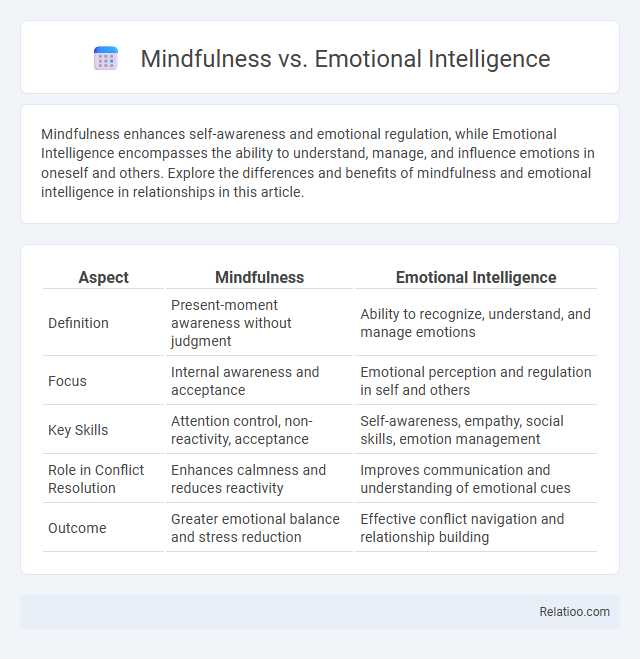Mindfulness enhances self-awareness and emotional regulation, while Emotional Intelligence encompasses the ability to understand, manage, and influence emotions in oneself and others. Explore the differences and benefits of mindfulness and emotional intelligence in relationships in this article.
Table of Comparison
| Aspect | Mindfulness | Emotional Intelligence |
|---|---|---|
| Definition | Present-moment awareness without judgment | Ability to recognize, understand, and manage emotions |
| Focus | Internal awareness and acceptance | Emotional perception and regulation in self and others |
| Key Skills | Attention control, non-reactivity, acceptance | Self-awareness, empathy, social skills, emotion management |
| Role in Conflict Resolution | Enhances calmness and reduces reactivity | Improves communication and understanding of emotional cues |
| Outcome | Greater emotional balance and stress reduction | Effective conflict navigation and relationship building |
Understanding Mindfulness: A Brief Overview
Mindfulness involves the intentional practice of present-moment awareness and non-judgmental observation of thoughts and emotions, enhancing self-regulation and stress reduction. Emotional intelligence encompasses the ability to recognize, understand, and manage one's own emotions and those of others, fostering empathy and effective interpersonal relationships. Understanding mindfulness deepens emotional intelligence by promoting greater emotional awareness and resilience through sustained attention and acceptance.
Defining Emotional Intelligence: Core Components
Emotional intelligence encompasses self-awareness, self-regulation, motivation, empathy, and social skills, enabling individuals to recognize and manage their emotions effectively while understanding others'. Mindfulness enhances emotional intelligence by fostering present-moment awareness and reducing emotional reactivity, improving emotional regulation and empathy. Integrating mindfulness practices strengthens the core components of emotional intelligence, leading to improved interpersonal relationships and emotional resilience.
Key Differences Between Mindfulness and Emotional Intelligence
Mindfulness centers on present-moment awareness and non-judgmental observation of your thoughts and feelings, enhancing self-regulation and emotional clarity. Emotional intelligence involves recognizing, understanding, and managing your own emotions as well as empathizing with others, which supports interpersonal relationships and effective communication. The key difference lies in mindfulness cultivating internal awareness and calm, while emotional intelligence applies that awareness outwardly to navigate social dynamics and emotional responses.
The Interplay: How Mindfulness Enhances Emotional Intelligence
Mindfulness enhances emotional intelligence by increasing your self-awareness and emotional regulation, allowing you to respond thoughtfully rather than react impulsively. Practicing mindfulness improves your ability to recognize and understand both your own emotions and those of others, strengthening empathy and social skills. This interplay fosters better decision-making and healthier interpersonal relationships grounded in emotional clarity and presence.
Benefits of Practicing Mindfulness
Practicing mindfulness enhances your emotional regulation by increasing awareness of your thoughts and feelings, leading to reduced stress and improved mental clarity. It promotes better focus, compassion, and resilience, which are foundational benefits that complement emotional intelligence skills. Regular mindfulness practice supports overall well-being and cognitive flexibility, making it a powerful tool for personal growth.
Advantages of Developing Emotional Intelligence
Developing emotional intelligence enhances self-awareness, improves interpersonal communication, and fosters better conflict resolution skills. It enables individuals to manage their emotions effectively, leading to reduced stress and increased empathy in personal and professional settings. Higher emotional intelligence contributes to stronger relationships, improved leadership capabilities, and greater overall psychological well-being.
Real-World Applications: Mindfulness in Daily Life
Mindfulness enhances your ability to stay present and manage stress through focused attention and awareness, improving emotional regulation in daily interactions. Emotional intelligence complements this by enabling you to recognize, understand, and respond effectively to both your own emotions and those of others, fostering better communication and relationships. Together, mindfulness and emotional intelligence empower practical applications like conflict resolution, empathy development, and resilience building in real-world scenarios.
Emotional Intelligence in Personal and Professional Relationships
Emotional Intelligence (EI) plays a crucial role in both personal and professional relationships by enhancing self-awareness, empathy, and effective communication. Unlike mindfulness, which centers on present-moment awareness and stress reduction, EI actively involves recognizing and managing emotions in oneself and others to foster collaboration and trust. Developing strong emotional intelligence skills leads to improved conflict resolution, better teamwork, and deeper interpersonal connections.
Integrating Mindfulness and Emotional Intelligence for Holistic Growth
Integrating mindfulness and emotional intelligence enhances your self-awareness and empathy, creating a foundation for holistic personal growth. Mindfulness sharpens your attention to present experiences while emotional intelligence improves your ability to manage emotions and build stronger relationships. Together, these skills foster resilience, better decision-making, and emotional balance in everyday life.
Choosing the Right Practice: Which One Suits You Best?
Mindfulness cultivates present-moment awareness by focusing on breath and sensations, while Emotional Intelligence enhances your ability to recognize, understand, and manage emotions in yourself and others. Choosing the right practice depends on your personal goals: mindfulness aids stress reduction and mental clarity, whereas emotional intelligence improves communication and relationship skills. Identifying whether you need better emotional regulation or increased attention and calmness will help you choose the most suitable approach for your growth.

Infographic: Mindfulness vs Emotional Intelligence
 relatioo.com
relatioo.com